|
|
|
Sort Order |
|
|
|
Items / Page
|
|
|
|
|
|
|
| Srl | Item |
| 1 |
ID:
190943
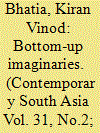

|
|
|
|
|
| Summary/Abstract |
In this article, I analyze discourses around the introduction of Intermediary Guidelines and Digital Media Code – new changes in laws regulating new media companies in India, and how these discourses inform the imaginations about the rights and duties of corporations and citizens in the country. I argue that though these guidelines were brought into effect through legal and juridical channels, they were reified through state-led and user-generated political discourse, constituting bottom-up imaginaries about the governance of social media platforms. To comprehensively analyze the impact of the guidelines regulating social media companies, this article argues for the need to examine the interlinkages between online discourse and policy regulations at three levels of operation: (a) the government’s imagination for the country’s digital future, (b) quotidian online discourse reifying the politics of regulation and (c) the dominant imagination of social media as socio-political actors responsible for upholding democracy, the freedom of speech of users, and dissent. Based on the findings and analysis, I argue that the regulation of social media platforms in India demonstrates reconfiguring relationships between social media companies, emerging forms of nationalism, and the government’s expectations of compliance from social media companies.
|
|
|
|
|
|
|
|
|
|
|
|
|
|
|
|
| 2 |
ID:
082543
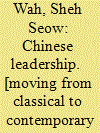

|
|
|
|
|
| Publication |
Singapore, Times Editions, 2003.
|
| Description |
x, 174p.Pbk
|
| Standard Number |
9812325484
|
|
|
|
|
|
|
|
|
|
|
|
Copies: C:1/I:0,R:0,Q:0
Circulation
| Accession# | Call# | Current Location | Status | Policy | Location |
| 052132 | 658.4092/WAH 052132 | Main | On Shelf | General | |
|
|
|
|
| 3 |
ID:
043462


|
|
|
|
|
| Publication |
DelhI, Vikas Publishing House Pvt. Ltd., 1974.
|
| Description |
xiii, 242p.Hbk
|
| Standard Number |
0706903072
|
|
|
|
|
|
|
|
|
|
|
|
Copies: C:1/I:0,R:0,Q:0
Circulation
| Accession# | Call# | Current Location | Status | Policy | Location |
| 013198 | 658.0450954/SEN 013198 | Main | On Shelf | General | |
|
|
|
|
| 4 |
ID:
041256


|
|
|
|
|
| Publication |
London, George Allen & Unwin Ltd., 1968.
|
| Description |
272p.Hbk
|
| Series |
Studies in Management
|
|
|
|
|
|
|
|
|
|
|
|
Copies: C:1/I:0,R:0,Q:0
Circulation
| Accession# | Call# | Current Location | Status | Policy | Location |
| 001009 | 658.301/ARG 001009 | Main | On Shelf | General | |
|
|
|
|
| 5 |
ID:
100284
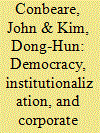

|
|
|
|
|
| Publication |
2010.
|
| Summary/Abstract |
The authors bring together and extend three strands of existing research: the propensity of democracies to ally with each other, the effects of alliances being institutionalized, and the causal impact of democracy in promoting investment. This literature is applied to corporate alliances, predicting the probability that announced alliance contracts will be completed by the participants. The authors find that democratic political regimes generate rules that create corporate shareholder democracy and that the latter promotes the institutionalization of corporate alliances. Corporate democracy and alliance institutionalization will both, controlling for transaction costs, increase the probability that corporate alliances will be completed. The findings suggest a positive association among democratic corporate governance, the willingness of corporate alliance partners to accept institutionalized ties, and the creation of an environment conducive to commercial investment commitments through alliances. Overall, corporations appear to respond to some of the same alliance incentives as sovereign states.
|
|
|
|
|
|
|
|
|
|
|
|
|
|
|
|
| 6 |
ID:
041891
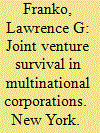

|
|
|
|
|
| Publication |
New York, Praeger Publishers, 1971.
|
| Description |
xv,217p.
|
| Series |
Praeger special studies in international economics and development
|
|
|
|
|
|
|
|
|
|
|
|
Copies: C:1/I:0,R:0,Q:0
Circulation
| Accession# | Call# | Current Location | Status | Policy | Location |
| 010331 | 338.70973/FRA 010331 | Main | On Shelf | General | |
|
|
|
|
| 7 |
ID:
041786


|
|
|
|
|
| Publication |
Bombay, progressive Corporation Private Ltd., 1971.
|
| Description |
xx, 521p.Hbk
|
|
|
|
|
|
|
|
|
|
|
|
Copies: C:1/I:0,R:0,Q:0
Circulation
| Accession# | Call# | Current Location | Status | Policy | Location |
| 007710 | 658.045/MAD 007710 | Main | On Shelf | General | |
|
|
|
|
| 8 |
ID:
043326
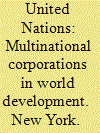

|
|
|
|
|
| Publication |
New York, United Nations, 1973.
|
| Description |
vi, 195p.
|
|
|
|
|
|
|
|
|
|
|
|
Copies: C:1/I:0,R:0,Q:0
Circulation
| Accession# | Call# | Current Location | Status | Policy | Location |
| 013360 | 338.88/UN 013360 | Main | On Shelf | General | |
|
|
|
|
| 9 |
ID:
031237
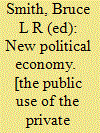

|
|
|
|
|
| Publication |
London, The Macmillan Press Limited, 1975.
|
| Description |
xiv,344p
|
|
|
|
|
|
|
|
|
|
|
|
Copies: C:1/I:0,R:0,Q:0
Circulation
| Accession# | Call# | Current Location | Status | Policy | Location |
| 014935 | 330/SMI 014935 | Main | On Shelf | General | |
|
|
|
|
| 10 |
ID:
091668
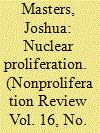

|
|
|
|
|
| Publication |
2009.
|
| Summary/Abstract |
As the potential for the involvement of corporations in the manufacture of nuclear weapons has increased, particularly through dual-use technology, global regulation has failed to keep pace. Where regulation of private corporations does exist, in the form of treaties, UN resolutions, or more informal arrangements, the obligations fall only on states. This state of affairs is a result of international law's traditional deference to state sovereignty; yet, it has led to significant shortcomings in the global regulatory regime, where states are unwilling or unable to meet their obligations. While radical departures from the traditional model of international law might remove the regulatory gaps caused by noncompliant states, such changes are unrealistic in the current political climate. More realistic changes must be focused on, offering greater recognition of the role of private corporations in nuclear proliferation and increasing state compliance with existing regulation.
|
|
|
|
|
|
|
|
|
|
|
|
|
|
|
|
| 11 |
ID:
142231
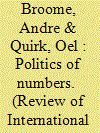

|
|
|
|
|
| Summary/Abstract |
Global benchmarks have grown exponentially over the last two decades, having been both applied to and developed by states, international organisations, corporations, and non-governmental organisations. As a consequence, global benchmarking is now firmly established as a distinct mode of transnational governance. Benchmarking chiefly involves the development of comparative metrics of performance, which typically take the form of highly stylised comparisons which are generated by translating complex phenomena into numerical values via simplification and extrapolation, commensuration, reification, and symbolic judgements. This process of translation takes what might otherwise be highly contentious normative agendas and converts them into formats that gain credibility through rhetorical claims to neutral and technocratic assessment. This politics of numbers has far-reaching ramifications for transnational governance, including the dimensions and effects of indirect power, expertise and agenda-setting, coordination, regulation and certification, and norm contestation and activism. This Special Issue draws upon an emerging literature to explore how and why benchmarks both align with and expand upon established models of International Relations theory and scholarship. It does so by critically examining the role of global benchmarks in key areas such as state ‘failure’, global supply chains, disaster management, economic governance, corporate social responsibility, and human development.
|
|
|
|
|
|
|
|
|
|
|
|
|
|
|
|
| 12 |
ID:
041279
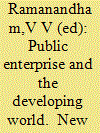

|
|
|
|
|
| Publication |
New Delhi, Select book service syndicate, 1984.
|
| Description |
234p.
|
| Standard Number |
0709922752
|
|
|
|
|
|
|
|
|
|
|
|
Copies: C:1/I:0,R:0,Q:0
Circulation
| Accession# | Call# | Current Location | Status | Policy | Location |
| 025254 | 338.9091724/RAM 025254 | Main | On Shelf | General | |
|
|
|
|
| 13 |
ID:
142571


|
|
|
|
|
| Summary/Abstract |
Relations between the state and labour NGOs in China have been particularly fraught. In 2012, they took an interesting turn when some local governments made overtures to labour NGOs to cooperate in providing services to migrant workers. This article argues that this shift is part of a broader strategy of “welfarist incorporation” to redraw the social contract between state and labour. There are two key elements to this strategy: first, a relaxation of the registration regulations for social organizations, and second, governmental purchasing of services from social organizations. These overtures have both a state and market logic to maintain social control and stabilize relations of production.
|
|
|
|
|
|
|
|
|
|
|
|
|
|
|
|
| 14 |
ID:
163320
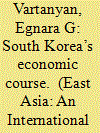

|
|
|
|
|
| Summary/Abstract |
The paper aims to investigate the transformation of South Korean economy from strict state regulation to liberalization and to fill in the gap in the historical analysis of the transition from import-substitution to export-oriented economy of South Korea. The study relies on the methods of comparative-historical, historical-typological, and historical-genetic analysis to consider the evolution of South Korean economic system, the change in economic development model, and the transition to a new economic strategy. The study also implies the use of interdisciplinary methods to systematize the empirical material, applying political-geographic, economic, and complex approaches. The paper gives periodization of South Korean economic development and investigates the reasons of country’s successful modernization and transition to export-oriented economy. Large corporations began to emerge in South Korea in the mid-1960s due to the active support from the state. They established the production of steel, marine vessels, automobiles, and electronic devices. The well thought-out government program brought notable success by the late 1990s, and South Korea gained the developed industrial base and powerful export potential. The afflux of foreign investments and the competitiveness of Korean products were mostly provided by low wages, traditional diligence, and Confucian education. Since the Korean strategy of economic development happened to be successful, there is a need for examining the experience of modernization as it can be useful for developing countries.
|
|
|
|
|
|
|
|
|
|
|
|
|
|
|
|
| 15 |
ID:
124629


|
|
|
|
|
| Publication |
2013.
|
| Summary/Abstract |
A significant proportion of the world's greenhouse gas emissions can be attributed, directly or indirectly, to corporate activities. An increasing number of companies have set targets and have adopted initiatives to reduce their greenhouse gas emissions, raising the question of what sorts of outcomes can realistically be expected from corporate action on climate change? This paper aims to shed some light on this issue through an analysis of the climate change performance of the UK supermarket sector. This sector is directly responsible for around 1% of UK greenhouse gas emissions, but it has been estimated that indirectly it may be responsible for up to 10% of emissions. In the period between 2000 and 2010, the major UK supermarkets transformed their approach to climate change. This paper examines the outcomes that resulted from these actions. It finds that there have been significant and steady improvements in energy efficiency, but that these efficiency gains are often outstripped by the impacts of business growth. For most companies, short of a radical redesign of their business activities, or an expansion of the scope of their energy management initiatives to include their indirect emissions, total greenhouse gas emissions will tend to increase over time.
|
|
|
|
|
|
|
|
|
|
|
|
|
|
|
|
| 16 |
ID:
049851
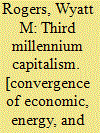

|
|
|
|
|
| Publication |
Westport, Quorum, 2000.
|
| Description |
xiii, 278p.
|
| Standard Number |
1567203604
|
|
|
|
|
|
|
|
|
|
|
|
Copies: C:1/I:0,R:0,Q:0
Circulation
| Accession# | Call# | Current Location | Status | Policy | Location |
| 043461 | 330.122/ROG 043461 | Main | On Shelf | General | |
|
|
|
|
|
|
|
|
|